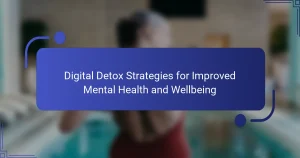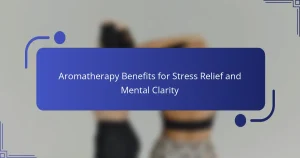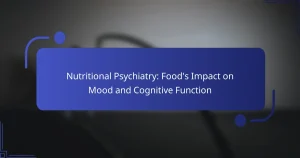Mindfulness techniques are essential for reducing stress and enhancing emotional resilience. These practices include meditation, deep breathing, and body scanning, which effectively manage stress responses. Regular engagement fosters self-awareness and focus, leading to improved decision-making under pressure. Additionally, culturally relevant adaptations and rare techniques like forest bathing can further enhance emotional well-being.
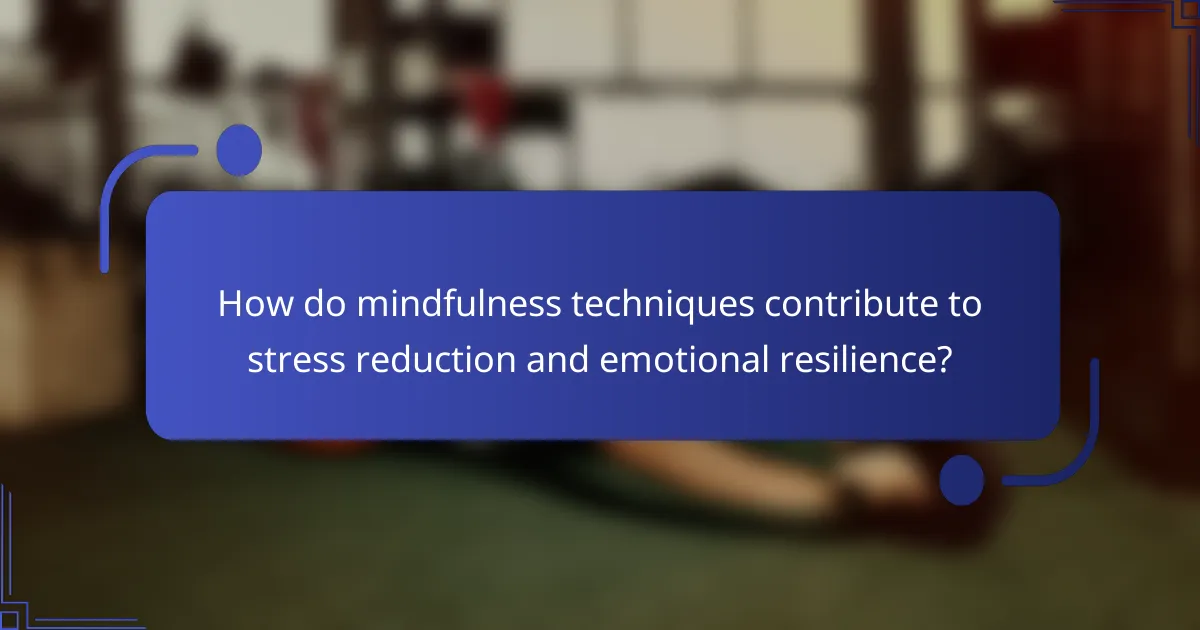
How do mindfulness techniques contribute to stress reduction and emotional resilience?
Mindfulness techniques significantly contribute to stress reduction and emotional resilience by promoting awareness and acceptance of the present moment. These practices, such as meditation and deep breathing, help individuals manage stress responses effectively.
Research indicates that mindfulness can lower cortisol levels, the hormone associated with stress, enhancing emotional regulation. Regular practice fosters a unique attribute of increased self-awareness, allowing individuals to recognize and respond to stressors constructively.
Additionally, mindfulness techniques encourage a rare attribute of improved focus and clarity, which supports better decision-making under pressure. As a result, practitioners often report heightened emotional resilience, enabling them to cope with challenges more effectively.
What are the psychological benefits of practicing mindfulness?
Practicing mindfulness offers significant psychological benefits, including reduced stress and enhanced emotional resilience. Mindfulness techniques help individuals manage anxiety, improve focus, and foster a greater sense of well-being. Research indicates that regular mindfulness practice can lead to a decrease in cortisol levels, which are associated with stress. Additionally, mindfulness enhances emotional regulation by promoting awareness of thoughts and feelings, enabling better responses to challenging situations. This practice also cultivates self-compassion, which can improve relationships and overall mental health.
How does mindfulness impact the brain’s stress response?
Mindfulness significantly reduces the brain’s stress response by enhancing emotional regulation and decreasing reactivity. Practicing mindfulness techniques, such as meditation and focused breathing, strengthens the prefrontal cortex, which is responsible for decision-making and impulse control. This leads to lower levels of cortisol, the stress hormone, and promotes a balanced emotional state. Studies show that regular mindfulness practice can result in a 30% reduction in stress levels, helping individuals build resilience against future stressors.
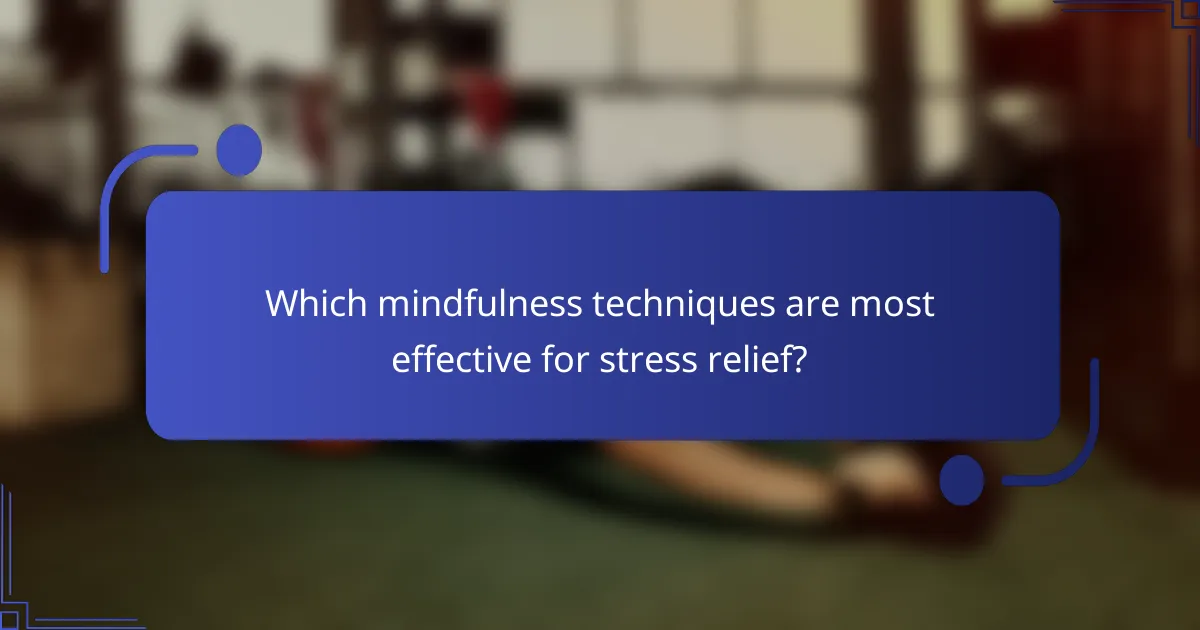
Which mindfulness techniques are most effective for stress relief?
Mindfulness techniques such as meditation, deep breathing, and body scanning are highly effective for stress relief. These practices enhance emotional resilience by promoting relaxation and increasing self-awareness.
Meditation encourages focus and calmness, often leading to a reduction in anxiety levels. Deep breathing exercises activate the body’s relaxation response, which can lower heart rates and reduce tension. Body scanning involves paying attention to different parts of the body, helping individuals identify and release physical stress.
Research indicates that regular mindfulness practice can lower cortisol levels, the hormone associated with stress. Incorporating these techniques into daily routines can significantly improve overall well-being and mental health.
How does mindful breathing help in managing stress?
Mindful breathing significantly reduces stress by promoting relaxation and enhancing emotional regulation. This technique encourages awareness of breath, which helps ground individuals in the present moment. As a result, it lowers cortisol levels and reduces anxiety symptoms. Research indicates that just a few minutes of mindful breathing can improve focus and emotional resilience, making it an effective tool for stress management.
What role does body scan meditation play in emotional resilience?
Body scan meditation enhances emotional resilience by fostering self-awareness and reducing stress. This technique encourages individuals to connect with their bodies, promoting relaxation and mindfulness. As a result, practitioners often experience decreased anxiety and improved emotional regulation. Research indicates that regular practice can lead to significant reductions in stress levels and increased feelings of well-being. By focusing on physical sensations, body scan meditation helps individuals recognize and process emotions, ultimately building a stronger foundation for emotional resilience.
How can mindful movement, such as yoga, enhance stress reduction?
Mindful movement, such as yoga, significantly enhances stress reduction by promoting relaxation and emotional balance. Engaging in yoga encourages deep breathing, which lowers cortisol levels and calms the nervous system. The practice fosters a connection between mind and body, helping individuals become more aware of their thoughts and feelings. This heightened awareness can lead to improved emotional resilience, allowing practitioners to manage stress more effectively. Research indicates that regular yoga practice can reduce anxiety and improve overall mental well-being.
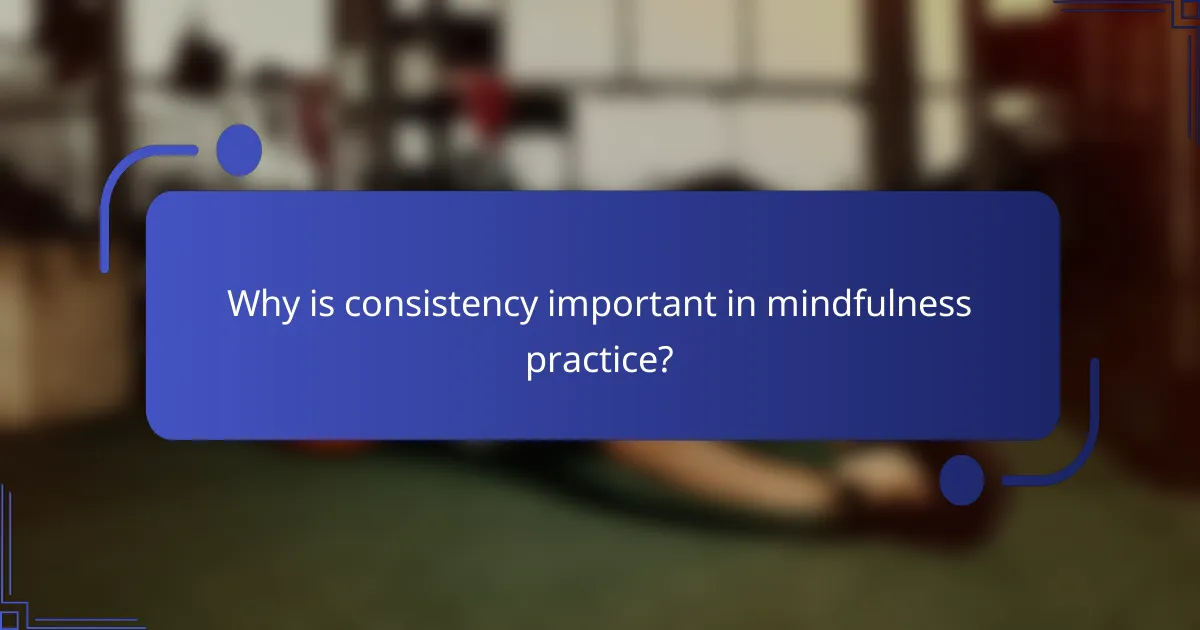
Why is consistency important in mindfulness practice?
Consistency is crucial in mindfulness practice because it fosters deeper emotional resilience and effective stress reduction. Regular engagement enhances awareness and cultivates lasting mental habits. As a result, individuals experience improved focus and a greater sense of calm. Research shows that consistent practice can lead to significant reductions in anxiety levels and increased overall well-being. Mindfulness techniques become more effective when practiced regularly, reinforcing the benefits over time.
How can daily mindfulness routines improve overall well-being?
Daily mindfulness routines significantly enhance overall well-being by reducing stress and fostering emotional resilience. These techniques promote a state of awareness that helps individuals manage their thoughts and feelings effectively. Research indicates that regular practice can lower cortisol levels, leading to reduced anxiety and improved mood.
Mindfulness practices, such as meditation and deep breathing, encourage a focus on the present moment. This shift in focus can lead to better emotional regulation and increased self-awareness. As a result, individuals often report greater life satisfaction and improved interpersonal relationships.
Incorporating mindfulness into daily life can take various forms, including mindful walking, eating, or even routine tasks. Each technique offers unique benefits, contributing to a holistic approach to mental health. Regular engagement in these practices builds resilience against stressors, enabling individuals to respond more calmly to challenges.
Overall, daily mindfulness routines not only enhance mental clarity but also promote a healthier, more balanced lifestyle.
What are the challenges of maintaining a regular mindfulness practice?
Maintaining a regular mindfulness practice can be challenging due to various factors. Common obstacles include time constraints, distractions, and difficulty in sustaining focus. Many individuals struggle to integrate mindfulness into their daily routines, often feeling overwhelmed by responsibilities. Additionally, the initial discomfort of facing one’s thoughts and emotions can deter consistent practice. Overcoming these challenges requires commitment and strategies to create a supportive environment for mindfulness.
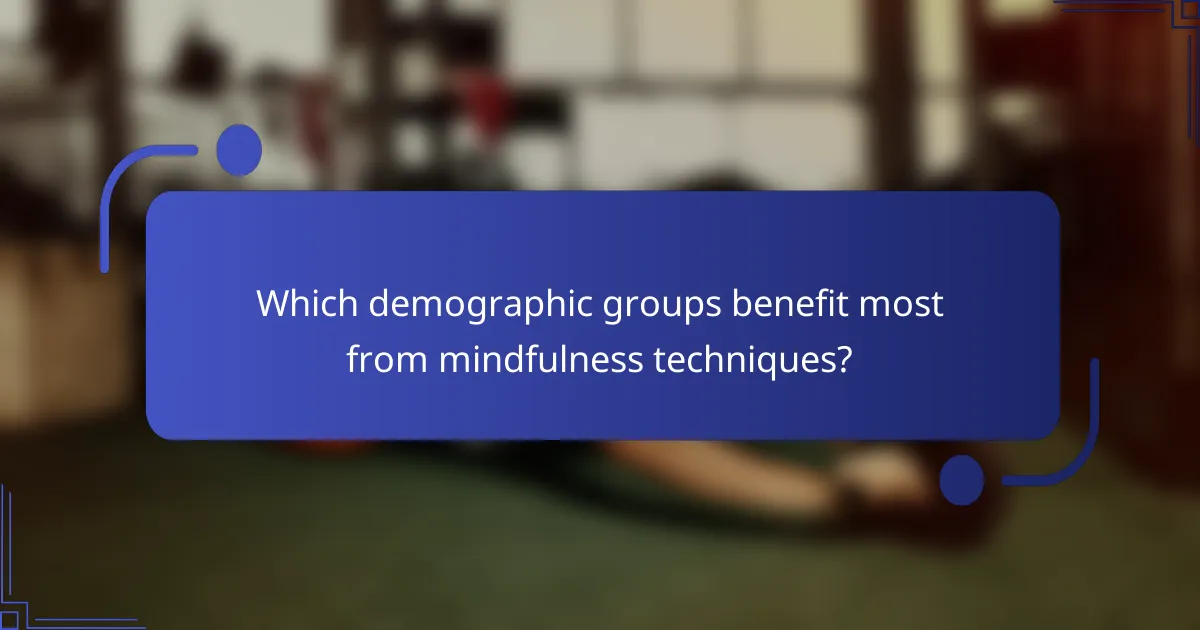
Which demographic groups benefit most from mindfulness techniques?
Mindfulness techniques benefit various demographic groups, particularly those experiencing high stress levels. Research indicates that students, caregivers, and professionals in high-pressure jobs report significant improvements in emotional resilience and stress management. Older adults also find mindfulness beneficial for enhancing cognitive function and overall well-being. Additionally, individuals with anxiety or depression experience notable reductions in symptoms through consistent mindfulness practice.
How do mindfulness practices differ in effectiveness across age groups?
Mindfulness practices differ in effectiveness across age groups due to varying cognitive and emotional development stages. Younger individuals may benefit from more dynamic and engaging techniques, while older adults often find value in structured, calming practices.
Research indicates that adolescents respond well to interactive mindfulness exercises, which can enhance their emotional regulation and stress management. In contrast, older adults tend to prefer practices like meditation and breathing exercises that promote relaxation and mental clarity.
Additionally, studies show that children may require shorter sessions to maintain focus, whereas older adults can engage in longer periods of mindfulness. This highlights the need for age-appropriate adaptations in mindfulness techniques to maximize their effectiveness.
Overall, tailoring mindfulness practices to specific age groups enhances their impact on stress reduction and emotional resilience.
What unique benefits do mindfulness techniques offer to professionals facing high stress?
Mindfulness techniques offer unique benefits such as enhanced focus, improved emotional regulation, and reduced anxiety for professionals facing high stress. These techniques promote present-moment awareness, which helps mitigate the overwhelming nature of stressors. Research indicates that mindfulness practices can lead to a 30% reduction in perceived stress levels. Additionally, they foster resilience, enabling professionals to respond more effectively to challenges. Regular practice can enhance cognitive flexibility, allowing for better problem-solving and decision-making under pressure.
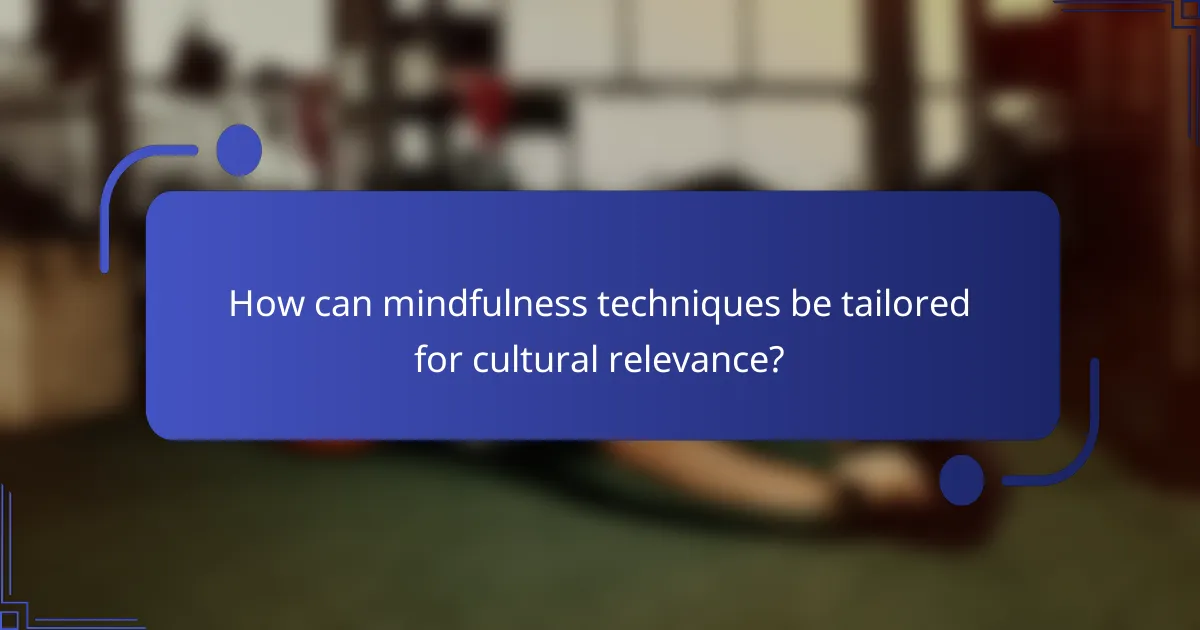
How can mindfulness techniques be tailored for cultural relevance?
Mindfulness techniques can be tailored for cultural relevance by integrating local practices, beliefs, and values. This approach enhances engagement and effectiveness in stress reduction and emotional resilience.
Cultural adaptations may include using familiar imagery, language, and rituals in mindfulness exercises. For instance, a community might incorporate traditional music or storytelling to create a relatable experience.
Research indicates that culturally relevant mindfulness practices lead to higher participant satisfaction and improved outcomes. These practices respect and honor cultural identities, fostering a deeper connection to the mindfulness process.
Incorporating feedback from community members ensures that techniques resonate with their unique experiences and perspectives, making mindfulness more accessible and impactful.
What mindfulness practices resonate with different cultural backgrounds?
Mindfulness practices vary across cultures, offering unique techniques for stress reduction and emotional resilience. Practices such as Zen meditation in Japan emphasize breath awareness, while mindfulness-based stress reduction (MBSR) in the West incorporates body scans and mindful movement.
In India, yoga combines physical postures with meditative practices to enhance mental clarity. Native American traditions often incorporate nature and storytelling, fostering a deep connection to the environment.
African cultures may use communal rituals and drumming to promote mindfulness through collective experiences. Each of these practices reflects cultural values, providing diverse pathways to emotional well-being and stress management.
How can regional differences influence the adoption of mindfulness techniques?
Regional differences significantly impact the adoption of mindfulness techniques. Cultural values, societal norms, and access to resources shape how mindfulness is perceived and practiced.
In regions where mental health awareness is high, mindfulness techniques are more readily embraced. For instance, urban areas often have more access to mindfulness workshops and resources compared to rural regions.
Additionally, cultural attitudes toward mental health influence acceptance. In some cultures, mindfulness may be viewed as a valuable tool for emotional resilience, while in others, it may face skepticism or stigma.
Finally, the integration of mindfulness into educational systems varies by region, affecting its adoption among younger populations. Regions prioritizing mental health education are likely to see higher engagement with mindfulness practices.
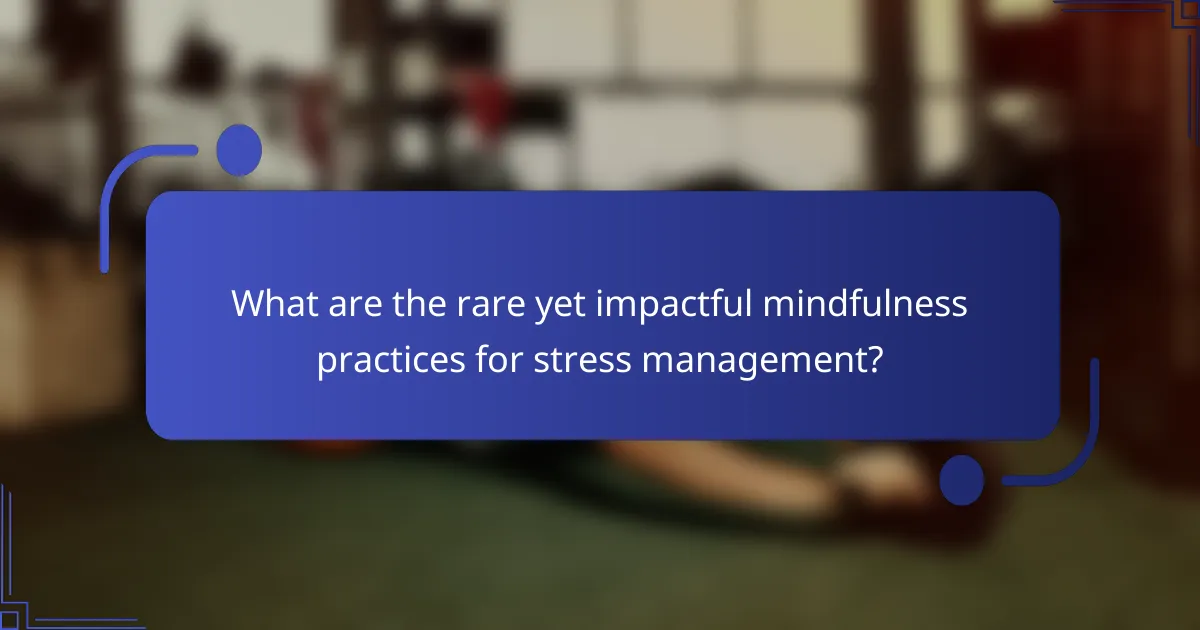
What are the rare yet impactful mindfulness practices for stress management?
Rare yet impactful mindfulness practices for stress management include techniques such as forest bathing, sound bathing, and mindful photography. These practices enhance emotional resilience and promote relaxation through unique sensory experiences.
Forest bathing, or Shinrin-yoku, immerses individuals in nature, reducing cortisol levels and fostering a sense of connection. Sound bathing utilizes sound frequencies to facilitate deep relaxation and mental clarity. Mindful photography encourages individuals to focus on the present moment, enhancing awareness and appreciation of their surroundings.
Incorporating these rare practices can significantly improve stress management and emotional well-being.
How does nature-based mindfulness enhance emotional resilience?
Nature-based mindfulness significantly enhances emotional resilience by fostering a deeper connection to the environment. Engaging with nature reduces stress and promotes a sense of calm. Studies show that spending time outdoors can lower cortisol levels, which directly influences emotional stability. Additionally, nature-based mindfulness practices, such as forest bathing, encourage present-moment awareness, leading to improved mental clarity and emotional regulation. These techniques cultivate a unique attribute of resilience through natural immersion, creating lasting benefits for mental health.
What unique mindfulness techniques are emerging in 2025?
Emerging mindfulness techniques in 2025 focus on personalized digital experiences and community-based practices. Virtual reality meditation is gaining traction, offering immersive environments for stress reduction. Biofeedback integration allows users to monitor physiological responses, enhancing emotional resilience. Group mindfulness sessions through apps foster social support, creating a sense of belonging. Additionally, nature-based mindfulness practices are being emphasized, promoting connection to the environment as a unique approach to mental well-being.
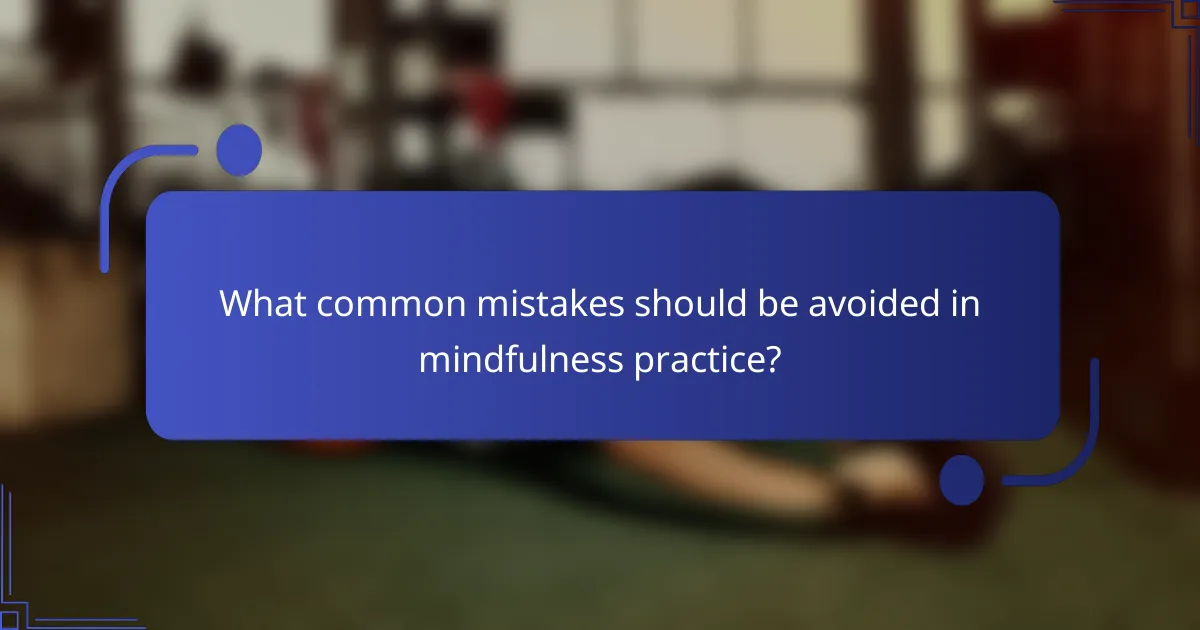
What common mistakes should be avoided in mindfulness practice?
Common mistakes to avoid in mindfulness practice include unrealistic expectations, neglecting consistency, and distractions during sessions. Practicing mindfulness requires patience and commitment.
1. Setting unrealistic expectations can lead to frustration. Mindfulness is a gradual process.
2. Inconsistent practice diminishes benefits. Regular engagement fosters emotional resilience.
3. Allowing distractions during practice reduces effectiveness. Create a conducive environment for focus.
4. Overthinking techniques can hinder progress. Trust the process and stay present.
5. Comparing your journey to others can create self-doubt. Focus on personal growth.
How can beginners effectively start their mindfulness journey?
Beginners can effectively start their mindfulness journey by practicing simple techniques regularly. Focus on breath awareness as a foundational practice. Set aside a few minutes daily for mindful breathing, noticing your inhalations and exhalations. Gradually incorporate body scans to enhance awareness of physical sensations. Engage in guided meditations to structure your practice and build consistency. Lastly, embrace mindfulness in daily activities, such as eating or walking, to cultivate presence. These techniques foster stress reduction and emotional resilience, essential for a fulfilling mindfulness journey.
What expert tips can enhance the effectiveness of mindfulness techniques?
To enhance the effectiveness of mindfulness techniques, focus on consistency, environment, and intention. Practicing mindfulness daily builds habit and reinforces emotional resilience. Creating a calming space minimizes distractions and promotes deeper engagement. Setting clear intentions before each session directs focus and enhances outcomes.
